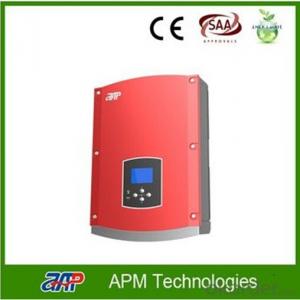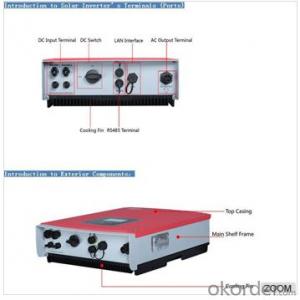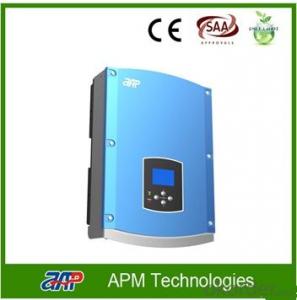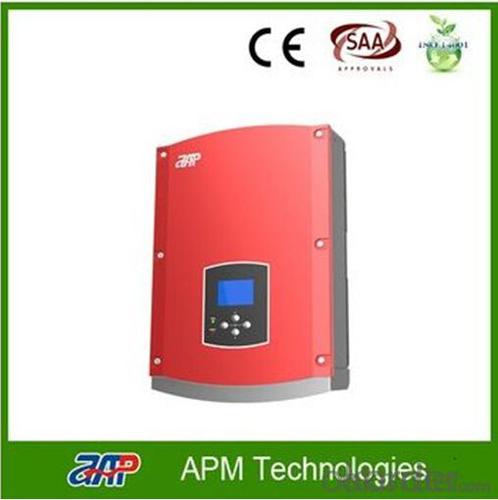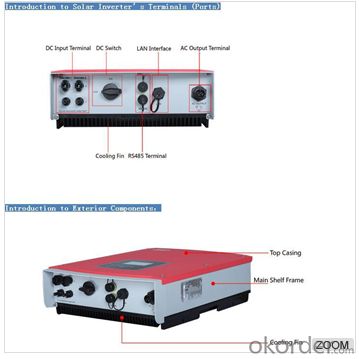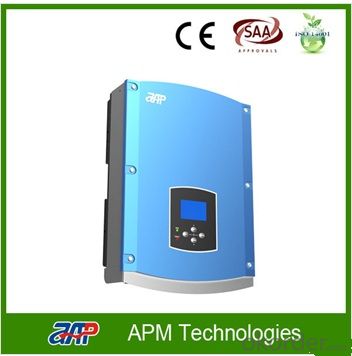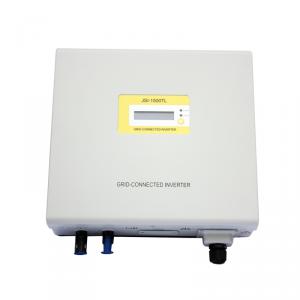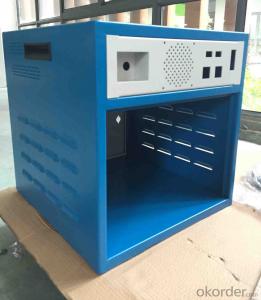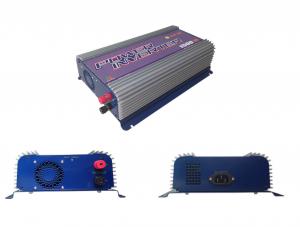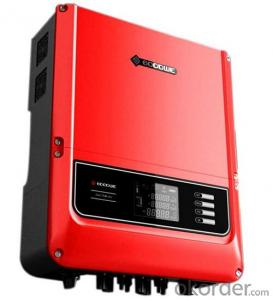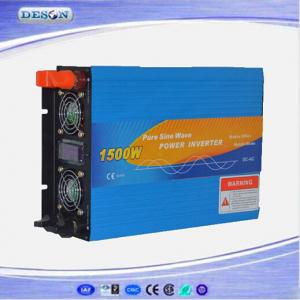Pv Inverter Single Phase Solar Inverter 1500W On Grid
- Loading Port:
- China main port
- Payment Terms:
- TT or LC
- Min Order Qty:
- 15000 watt
- Supply Capability:
- 3000000 watt/month
OKorder Service Pledge
OKorder Financial Service
You Might Also Like
1. Structure of Pv Inverter Single Phase Solar Inverter 1500W On Grid Description
1) Transformerless single phase on Grid pv Inverter
2)12v DC to 220v AC 1500W 50Hz/60Hz Solar Power Inverter, Pure Sine Wave Inverter.
3) IP 65 1500w On grid Pv Solar Inverter.
2. Main Features of the Pv Inverter Single Phase Solar Inverter 1500W On Grid
﹒High quality .
﹒competitive wholesale price.
﹒5years warranty
﹒Power Factor:>0.99 with nominal AC current
﹒AC Voltage Range:150V-550Vac
﹒Nominal AC Power:1500W
3. Pv Inverter Single Phase Solar Inverter 1500W On Grid Images
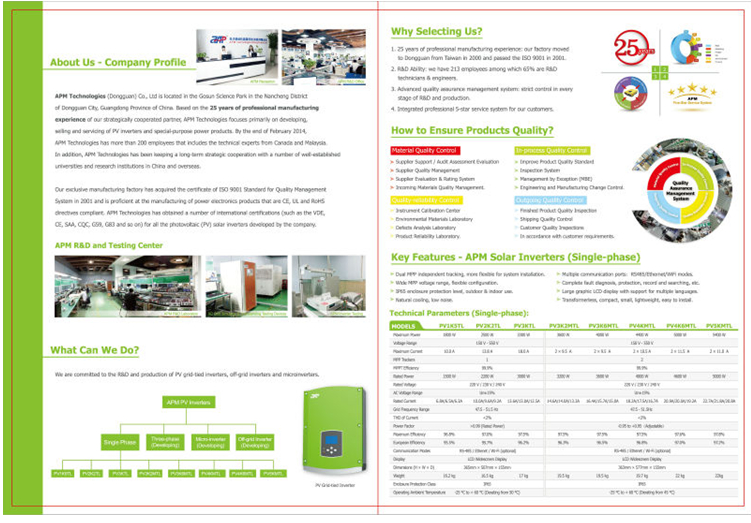
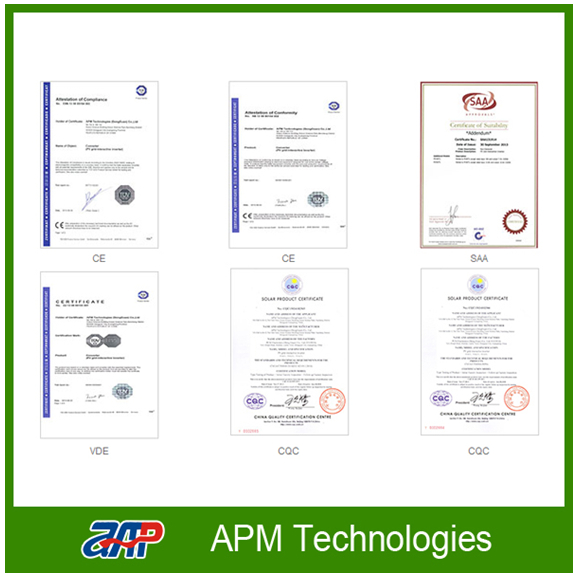
4. Pv Inverter Single Phase Solar Inverter 1500W On Grid Specification
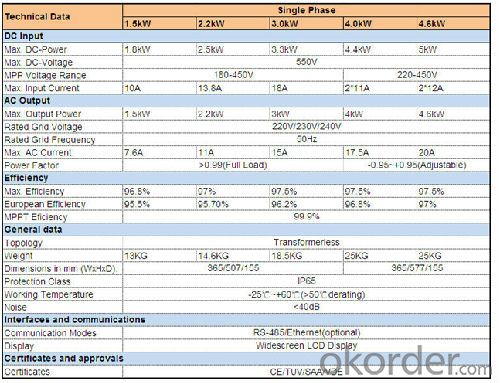
5. FAQ of Pv Inverter Single Phase Solar Inverter 1500W On Grid
Q1. What is the difference between inverter and solar inverter?
A1. Inverter only has AC inpput, but solar inverter both connect to AC input and solar panel, it saves more power.
Q2. What is the difference between MPPT&PWM?
A2. MPPT has higher efficiency, it can track the max power point and won't waste energy.
Q3. What is the waranty of product?
A3. 5 years .
- Q: What are the indicators of a faulty solar inverter?
- Some indicators of a faulty solar inverter include, but are not limited to, a sudden drop in power output, unusual noises or vibrations coming from the inverter, error messages or warning lights displayed on the inverter's screen, frequent shutdowns or restarts, and a lack of communication or connection with the solar monitoring system.
- Q: Can a solar inverter be used in systems with different module efficiencies?
- Yes, a solar inverter can be used in systems with different module efficiencies. The solar inverter is designed to convert the DC electricity produced by the solar modules into AC electricity that can be used in the electrical grid or to power appliances. It does not depend on the module efficiency, but rather on the DC voltage and current produced by the modules. Therefore, as long as the DC output of the modules falls within the specifications of the solar inverter, it can be used regardless of the module efficiencies.
- Q: How does a solar inverter handle grid disturbances (voltage sags, swells, flickers)?
- A solar inverter handles grid disturbances such as voltage sags, swells, and flickers by constantly monitoring the grid's voltage and frequency. When a disturbance occurs, the inverter utilizes its internal control mechanisms to adjust the solar power output accordingly. It can compensate for voltage sags by injecting additional power into the grid, and it can reduce power output during voltage swells to prevent overloading. Additionally, the inverter's control algorithms help minimize flickering by maintaining a stable and consistent power supply to the grid.
- Q: Can a solar inverter be used in a mobile or portable solar system?
- Yes, a solar inverter can be used in a mobile or portable solar system. In fact, it is a crucial component that converts the direct current (DC) generated by the solar panels into alternating current (AC) that can be used to power various devices and appliances. Portable solar systems often include a built-in inverter, allowing them to provide convenient and clean energy on the go.
- Q: What are the different types of solar inverters available?
- There are several types of solar inverters available, including string inverters, microinverters, and power optimizers. String inverters are the most common and are installed at a central location, converting the DC power generated by multiple solar panels into AC power. Microinverters, on the other hand, are installed on each individual solar panel, converting the DC power to AC power at the panel level. Power optimizers are similar to microinverters but work in conjunction with a string inverter, optimizing the power output of each panel before it reaches the inverter. Each type of inverter has its own advantages and suitability based on the specific solar installation requirements.
- Q: In a photovoltaic grid-connected project, the role of the inverter is to convert the voltage into AC 220V or 380V for the grid, since the transformer will raise the voltage again
- Spontaneous use is a way of grid, that is issued to the electricity, mainly their own family or internal use, the excess part of the power to the grid
- Q: Can a solar inverter be used in remote areas without access to the grid?
- Yes, a solar inverter can be used in remote areas without access to the grid. Solar inverters are designed to convert the direct current (DC) electricity generated by solar panels into alternating current (AC) electricity that can be used to power electrical appliances. In remote areas, solar panels can be installed to harness sunlight and convert it into electricity, which can then be used through the solar inverter to provide power to homes, businesses, or any other electrical devices without the need for a grid connection.
- Q: Can a solar inverter be used in systems with different module currents?
- Yes, a solar inverter can be used in systems with different module currents. Solar inverters are designed to convert the DC power produced by the solar panels into AC power for use in the electrical grid or for powering appliances. They typically have a wide range of input voltage and current ratings to accommodate different solar panel configurations. As long as the total power output of the solar panels is within the specifications of the inverter, it can be used in systems with varying module currents.
- Q: How does the power factor correction affect the performance of a solar inverter?
- Power factor correction can significantly improve the performance of a solar inverter. By correcting the power factor, the inverter can optimize the energy conversion process, resulting in increased efficiency and reduced losses. This correction helps in minimizing reactive power, improving voltage stability, and enhancing the overall power quality of the inverter. Ultimately, power factor correction ensures that the solar inverter operates at its maximum capacity, leading to improved performance and increased energy output.
- Q: What is the difference between a string inverter and a microinverter?
- A string inverter is a central inverter that converts the DC power generated by multiple solar panels connected in series into AC power. On the other hand, a microinverter is a smaller inverter that is attached to each individual solar panel, converting the DC power generated by each panel into AC power. The main difference is that string inverters are used for multiple panels, while microinverters are used for individual panels.
Send your message to us
Pv Inverter Single Phase Solar Inverter 1500W On Grid
- Loading Port:
- China main port
- Payment Terms:
- TT or LC
- Min Order Qty:
- 15000 watt
- Supply Capability:
- 3000000 watt/month
OKorder Service Pledge
OKorder Financial Service
Similar products
Hot products
Hot Searches
Related keywords
